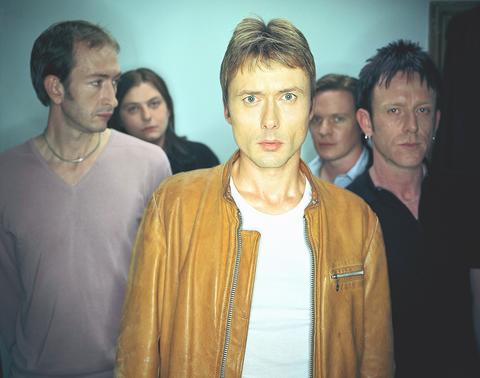After 13 years, a tabloid news-making line-up change and countless rumors of drug-addiction, kick starters of the Britpop movement, Suede has out-witted many of its critics.
After releasing its fifth album, A New Morning, late last year, the band effectively quashed all rumors of any pending demise and has instead gone on to achieve almost cult status both at home in the UK and the US with a new very un-Suede upbeat sound.

PHOTOS COURTESY OF SONY MUSIC
Although it's been four months since the album hit record store shelves, Suede will be bringing its rejuvenated self to Asia over the coming weeks with a tour that will see the band performing in Taipei, Singapore, Jakarta, Hong Kong and China. The tour begins tomorrow night when Suede takes to the stage of NTU Stadium (
Formed in the late 1980s, Suede hit the music scene like a ton of bricks in 1993 when the combo's self-titled debut album broke all previous records and became the fastest-selling UK debut of all time. The band's problems, however, were never far away.
While vocalist Brett Anderson and guitarist Bernard Butler have been credited for bringing back the long-forgotten three-minute single as well putting the mystique back into British pop music, the song writing partnership was almost as fiery as that of Joe Strummer and Mick Jones.
The well-publicized feuding came to a head during the recording of the band's second album, 1994's Dog Man Star. Butler left the band before the album had been released, which, if the tabloid-styled UK music press is to be believed, was the reason the album was a commercial flop.
Although it would be three years before Suede was to record another album, Anderson and his combo battled on without Butler. Replacing him with a 17-year-old guitarist by the name of Richard Oaks in 1994, Suede went back on the road and finally into the studio to record Coming Up in late 1995.
Turning the tables on pro-Butler cliches, many of which suggested that without the pragmatic guitarist Suede was dead in the water, the album became the band's most successful release of all time -- and proved that even without Butler, Suede was a band with a sound to be reckoned with.
Entering the UK album charts at number one on its release in 1997, Coming Up spawned a remarkable five Top Ten singles -- Trash, Beautiful Ones, Saturday Night, Lazy and Filmstar.
Ditching longtime producer, Ed Buller a year later, Anderson called on the talents of ex-New Order and Happy Monday's producer, Steve Osborne for the group's 1999 release, Head Music. The result was an album that attempted to rekindle Suede's early glam/Britpop signature sound.
A sound that Suede fans in Taiwan came close to hearing. The 921 earthquake in 1999 scuttled the band's plans to play in Taipei, however, and the gig was canceled at the last minute.
The band's latest studio venture and the sounds that will be reverberating through NTU Stadium, sees Anderson and company veering away from the tragic and dark musical days.
Instead Suede has cooked up a collection of rather upbeat tunes packed with glam-rock smarts, indie/pop riffs and some oddly un-Suede-ish acoustic numbers.
While the band is keeping mum about the set-list, fans of early post-Butler departure classics such as the Bowie-esque Heroine or the glam-rock riff-laden Metal Mickey could be in for a treat tomorrow night, however.
Suede will performing in Taipei at 7:30pm tomorrow evening at NTU Stadium (

US President Donald Trump may have hoped for an impromptu talk with his old friend Kim Jong-un during a recent trip to Asia, but analysts say the increasingly emboldened North Korean despot had few good reasons to join the photo-op. Trump sent repeated overtures to Kim during his barnstorming tour of Asia, saying he was “100 percent” open to a meeting and even bucking decades of US policy by conceding that North Korea was “sort of a nuclear power.” But Pyongyang kept mum on the invitation, instead firing off missiles and sending its foreign minister to Russia and Belarus, with whom it

When Taiwan was battered by storms this summer, the only crumb of comfort I could take was knowing that some advice I’d drafted several weeks earlier had been correct. Regarding the Southern Cross-Island Highway (南橫公路), a spectacular high-elevation route connecting Taiwan’s southwest with the country’s southeast, I’d written: “The precarious existence of this road cannot be overstated; those hoping to drive or ride all the way across should have a backup plan.” As this article was going to press, the middle section of the highway, between Meishankou (梅山口) in Kaohsiung and Siangyang (向陽) in Taitung County, was still closed to outsiders

President William Lai (賴清德) has championed Taiwan as an “AI Island” — an artificial intelligence (AI) hub powering the global tech economy. But without major shifts in talent, funding and strategic direction, this vision risks becoming a static fortress: indispensable, yet immobile and vulnerable. It’s time to reframe Taiwan’s ambition. Time to move from a resource-rich AI island to an AI Armada. Why change metaphors? Because choosing the right metaphor shapes both understanding and strategy. The “AI Island” frames our national ambition as a static fortress that, while valuable, is still vulnerable and reactive. Shifting our metaphor to an “AI Armada”

The Chinese Communist Party (CCP) has a dystopian, radical and dangerous conception of itself. Few are aware of this very fundamental difference between how they view power and how the rest of the world does. Even those of us who have lived in China sometimes fall back into the trap of viewing it through the lens of the power relationships common throughout the rest of the world, instead of understanding the CCP as it conceives of itself. Broadly speaking, the concepts of the people, race, culture, civilization, nation, government and religion are separate, though often overlapping and intertwined. A government